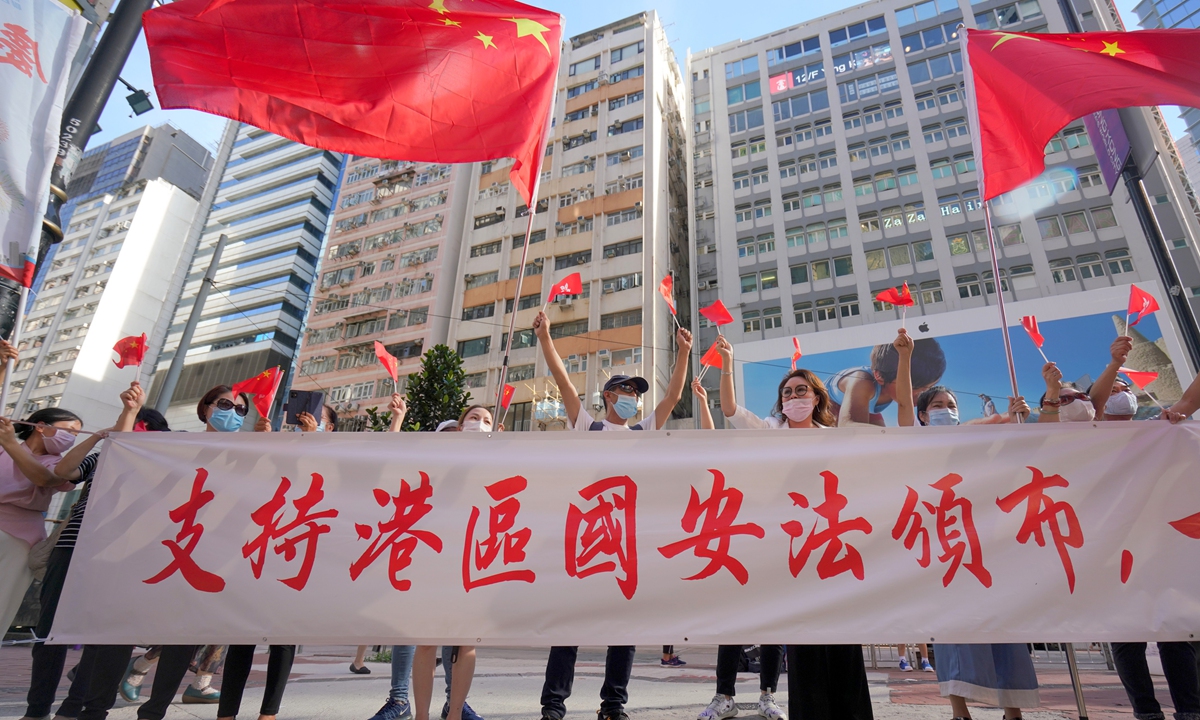Appointing Luo signals central govt's liaison office in HK will have stronger influence: senior advisor
By Bai Yunyi Source:Global Times Published: 2020/7/3 17:53:38

Hong Kong citizens on Tuesday gather to support the National Security Law for Hong Kong. Photo: cnsphoto
The appointment to the new national security agencies in Hong Kong signaled that the central government's liaison office in the city will have a stronger influence and that it is the central government's detailed, long-term plan, instead of a quick decision, a senior advisor to the central government on Hong Kong policies said on Friday.
China's central government has appointed Luo Huining, director of the Central Government's Liaison office in the Hong Kong Special Administrative Region (HKSAR), as the national security advisor to the HKSAR Committee for Safeguarding National Security. He will provide guidance on safeguarding national security matters and serve as a key bridge in coordination work between the central and regional authorities.
Under the new personnel arrangement, Luo will serve three positions at the same time: director of the liaison office; deputy director of the Hong Kong and Macao Affairs Office of the State Council, and national security advisor to the committee. Lau Siu-kai, vice president of the Chinese Association of Hong Kong and Macao Studies, believed it means that Luo's role as national security advisor will more directly represent the central government's position, meaning that he could exert influence on supervision, guidance and assistance in national security affairs, and also effectively promote contact and coordination between the central government and HKSAR government to maintain national security.
During the Fourth Plenary Session of the 19th Communist Party of China (CPC) Central Committee in October 2019, the central committee made up its mind to deal with Hong Kong's deep-seated political issues and reduce the space for hostile forces both at home and abroad, Lau said.
"Therefore, naming the director of the liaison office as the national security advisor to the committee also means that when implementing new policy on Hong Kong, the central government's leading role will be further demonstrated through the work of the liaison office, meaning that the actual influence of the liaison office may be improved," he pointed out.
Lau noted that the central government made its appointments on the third day after the national security law for Hong Kong came into effect. On one hand, it reflects the CPC central committee's determination to implement the decision of the Fourth Plenary Session of the 19th CPC Central Committee; on the other hand, it indicates that the central government has already made its plan to solve the issue of national security in Hong Kong for the long-term.
It also shows that the central government hopes the national security law for Hong Kong can display its deterrent effect for actions that endanger national security in the HKSAR.
Regarding the personnel arrangement of the office for safeguarding national security of the central government in the Hong Kong Special Administrative Region, Lau said that the head, from South China's Guangdong Province, should be more familiar with the situation in Hong Kong, which means cooperation between Guangdong, Hong Kong and Macao will be the top priority for safeguarding national security in the future.
He said the personnel arrangements of the committee and office also showed that the two agencies will support each other, be in close communication, and take joint action when necessary. The committee will assist the office in the exercise of jurisdiction in certain cases.
Posted in: HK/MACAO/TAIWAN